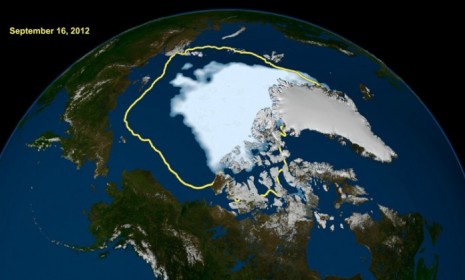How China is trying to capitalize on global warming: A guide
The Earth's changing climate is melting the Arctic ice sheets, starting a global rush for the goodies underneath

A free daily email with the biggest news stories of the day – and the best features from TheWeek.com
You are now subscribed
Your newsletter sign-up was successful
First, the bad news: Sea ice in the Arctic shrank to its smallest area on record this past summer, and the much-faster-than-expected rate of seasonal disappearance of Arctic ice will likely wreak havoc on weather in the Northern Hemisphere. The good news, says Hamilton Nolan at Gawker, is that while this manmade "'global disaster' with 'terrible' implications" could destroy us all, "a lot of people could make a lot of ca$$$h" first. Indeed, the financial benefits of the vanishing ice — new access to oil, minerals, and shipping routes — aren't lost on the world's superpowers. But unlike the U.S., Russia, Canada, and parts of Europe, China doesn't own any stake in the Arctic, and is very aggressively trying to hone in on the action. Here, a look at the coming, well, cold war in the Arctic:
Who does own the Arctic?
Eight countries each own a piece — the U.S., Russia, Canada, Sweden, Norway, Finland, Iceland, and Denmark (representing Greenland) — and they develop and coordinate policy through a loose international federation called the Arctic Council. The council used to mostly focus on things like monitoring animal populations, but now it gets juicer fare like mediating newly important border disputes and agreeing on future port fees. "We've changed from a forum to a decision-making body," Sweden's Gustaf Lind, the Arctic Council's chairman, tells The New York Times.
The Week
Escape your echo chamber. Get the facts behind the news, plus analysis from multiple perspectives.

Sign up for The Week's Free Newsletters
From our morning news briefing to a weekly Good News Newsletter, get the best of The Week delivered directly to your inbox.
From our morning news briefing to a weekly Good News Newsletter, get the best of The Week delivered directly to your inbox.
What is China doing to elbow its way in?
It's lobbying hard to get permanent observer status at the Arctic Council, arguing both that it's a "near Arctic state" and that the Arctic is "the inherited wealth of all humankind." That would keep China from being "shut out from decisions on minerals and shipping," East Asia expert Linda Jakobson tells The New York Times. Japan, South Korea, and the EU are also seeking permanent observer status. But China has something the other applicants don't — mounds and mounds of cash — and it's working aggressively to "garner influence through a strategy that has worked well in Africa and Latin America," says Elisabeth Rosenthal in The Times: Investing and spending its way into the good graces of cash-poor countries, in this case Iceland and Greenland.
Is China's push working?
It seems to be. Iceland, Denmark, and Sweden now openly back China's bid for Arctic Council observer status, and large Chinese companies have invested heavily in mines in Greenland, oil companies in Canada, and Iceland's energy sector. This has caused some alarm, and some pushback, from rival powers. NATO and council nations have built up their military presence in the Arctic, and China's high-level diplomatic outreach has been matched by the U.S., Korea, and Europe. In June, EU Vice President Antonio Tajani made an emergency visit to Greenland to offer millions in aid to ensure the country didn't give exclusive mining rights to China for newly de-iced veins of rare earth metals. "We are treated so differently than just a few years ago," Greenland Vice Premier Jens B. Frederiksen tells The New York Times. "We are aware that is because we now have something to offer, not because they've suddenly discovered that Inuit are nice people."
A free daily email with the biggest news stories of the day – and the best features from TheWeek.com
Should America be worried?
Well, the Arctic could be completely ice-free in the summer by the end of the decade — and that may thrust humanity "into its inevitable final Water World-esque battle for our earth's swamped, dwindling resources," as Gawker's Nolan puts it. But China, at least, says we shouldn't worry about Beijing's intentions: "China's activities are for the purposes of regular environmental investigation and investment and have nothing to do with resource plundering and strategic control," state-run Xinhua news service said this year. Few people buy that, but Chinese plundering isn't the end of the world. "Despite the concerns I have about Chinese foreign policy in other parts of the world, in the Arctic it is behaving responsibly," Michael Byers, a professor at the University of British Columbia, tells The New York Times. "They just want to make money."
Sources: Gawker, New York Times, Newser, Washington Post
-
 The environmental cost of GLP-1s
The environmental cost of GLP-1sThe explainer Producing the drugs is a dirty process
-
 Greenland’s capital becomes ground zero for the country’s diplomatic straits
Greenland’s capital becomes ground zero for the country’s diplomatic straitsIN THE SPOTLIGHT A flurry of new consular activity in Nuuk shows how important Greenland has become to Europeans’ anxiety about American imperialism
-
 ‘This is something that happens all too often’
‘This is something that happens all too often’Instant Opinion Opinion, comment and editorials of the day